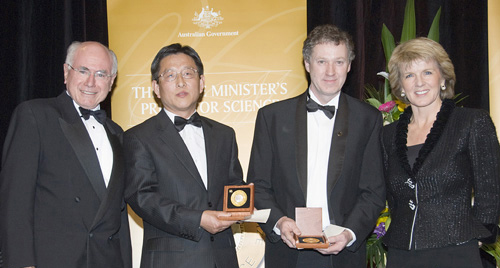近日,备受关注的2007澳大利亚“总理科学奖”颁发,“总理科学奖”是澳大利亚最高的科学奖项,我国科学家王明波博士因在植物基因沉默研究领域的杰出贡献而与澳大利亚联邦科学与工业研究组织植物研究所彼得.沃特豪斯博士共同荣获了此项最富有盛名的科学奖项。
王明波博士1984年毕业于北京大学化学系;1987年获得中国科学院生态环境研究中心理学硕士学位;其后进入中国农科院生物技术研究中心,在范云六院士的指导下,他开始了从事植物分子生物学的研究生涯,三年后范云六院士通过所主持的洛克菲勒基金项目将其派送到英国深造,1994在英国Durham大学获博士学位;1998迄今在澳大利亚联邦科学与工业研究组织植物研究所从事研究。曾获1999年联邦科学与工业研究组织植物研究所所长奖,2005年联邦科学与工业研究组织院长奖,并入选2007年澳大利亚最聪明科学家奖。 王明波和彼得.沃特豪斯博士的这一发现导致了基因沉默技术的诞生,迄今为止已诞生100多个专利,使这项技术广泛应用到各生物科学领域。该技术已成功地应用于改良植物基因、提高植物的抗病毒能力、系统确定植物基因的功能、抑制致病基因等领域,并为基因治疗提供了革命性的手段。
王明波博士在取得巨大研究成果时心系祖国,多次回到中国农业科学院讲学,并与范云六院士课题保持合作研究,为我国农业科学研究贡献力量。

2007 Prime Ministers Prize for Science Dr Peter Waterhouse and Dr Ming-Bo Wang
The human genome project found we have around 32,000 genes-only a few more than other animals, insects and most plants. Knowing how those genes are turned on and off is a key to understanding how a few thousand genes interact to create a human, a fly or a wheat plant.
While investigating how plants respond to virus attack, Peter Waterhouse, Ming-Bo Wang and their team at CSIRO Plant Industry in Canberra discovered a new way to control plant genes-by using the plants own viral defence mechanisms.
They realised they could harness the plants immune response to stop information being transferred from any gene in the cell nucleus to the protein factories of the cell. The genes weren't destroyed but they were effectively gagged or silenced.
Around the same time, US scientists discovered a similar form of gene silencing in animals - and received a Nobel prize for their work.
But it's Peter and Ming-Bo's discovery that is finding wider application across the biological sciences. It's generated more than 100 patents to date and is helping us understand the workings of plant, animal and human genomes.
For their discovery of how to silence genes in plants, Peter Waterhouse and Ming-Bo Wang receive the 2007 Prime Minister's Prize for Science.
In the 1990's Peter Waterhouse, Ming-Bo Wang and their colleagues in CSIRO Plant Industry were investigating the 'immune system' of plants with the aim of developing better ways to protect crop plants from viruses.
It's very important work. One virus alone - barley yellow dwarf virus - cuts the global wheat harvest by about two per cent, and a range of further viral diseases lead to reduced yields in other crops around the world.
The concept of an immune defence in humans has been well understood for many years. It's less well known that plants can be protected from virus attack by 'immunisation'-exposure to a mild strain of the virus. The process was first described in the 1920s but its mechanism has been a mystery.
Plant viruses are mostly RNA-based. When they infect cells, the viruses hijack the cellular machinery, and make double-stranded RNA as a step to creating new RNA viruses. Normally, there is no double-stranded RNA in uninfected plant cells.
In 1995, working with potato and tobacco plants, the research team discovered that plants might be using this double-stranded RNA to mount a defence against viral infection. That led to a series of experiments to understand the mechanism and also to see if it could be harnessed to modify plants-making them less susceptible to disease for example.
In 1997 they hit the jackpot.
Working with rice and tobacco plants, Peter and Ming-Bo found that plants have mechanisms to identify and cut up the double-stranded RNA produced by invading viruses. The plants then bind these bits of alien RNA to an enzyme (a nuclease) which is able to locate and destroy the normal single stranded RNA of the virus.
"The science has been exciting," says Ming-Bo. "Exploring the world of intellectual property has been a more challenging but necessary experience." "At one point we seemed to spend more time talking law then we did talking science," says Peter. "But it's led to a strong patent position that gives people the chance to use the technology and also brings returns to CSIRO and Australia."
While the rest of the world finds new ways to apply the technology, Peter and Ming-Bo are applying their work to projects that have the capacity to transform agriculture and reduce greenhouse gas emissions.
"We can use the technology to insert genes into plants that will protect them against multiple viruses," says Ming-Bo.
"I'd like to see gene-silencing used to combat climate change," says Peter. "For example, we are working to create plants that could produce biofuels customised for different engines. These crops would be much more efficient at making biofuels than the current processes using corn or sugar," he says.
"They'd capture the CO2 when they grow, and release it when used as fuel-a closed circle with no net carbon emissions!"
Ming-Bo Wang
Academic record
1990-94 PhD, University of Durham, Durham, UK 1984-87 MSc, Chinese Academy of Sciences, Beijing, China 1980-84 BSc, Peking University, Beijing, China
Relevant research experience
1998-now Senior research scientist, CSIRO Division of Plant Industry 1994-98 Postdoctoral Research Fellow, Research Fellow Cooperative Research Centre for Plant Science 1990-94 PhD Department of Biological Sciences, University of Durham, UK 1987-90 Junior Research Scientist, Biotechnology Research Centre, Chinese Academy of Agricultural Sciences, Beijing, China
Scholarship and awards
2007 Winner of The Bulletins Smartest Scientists in Australia 2005 CSIRO Chairmans Medal 1999 CSIRO Plant Industry Chiefs Award 1990-94 Rockefeller Foundation Fellowship


